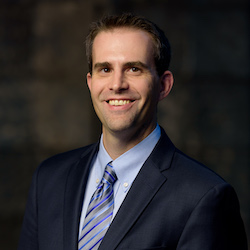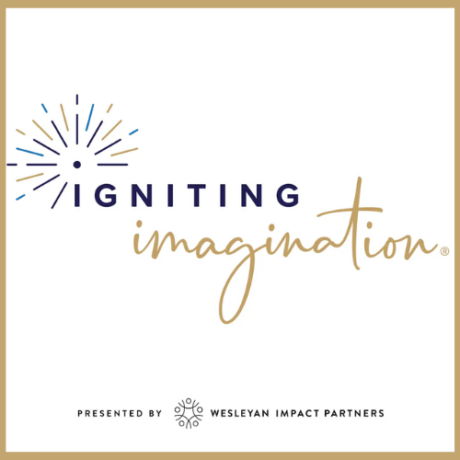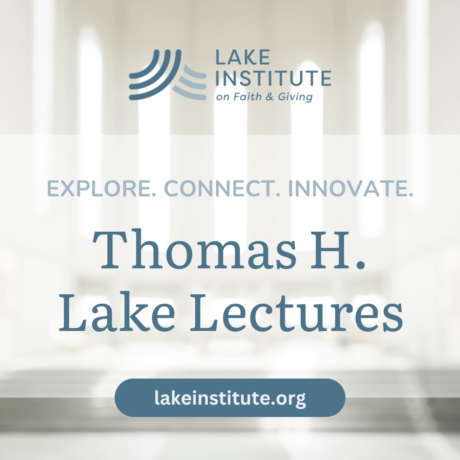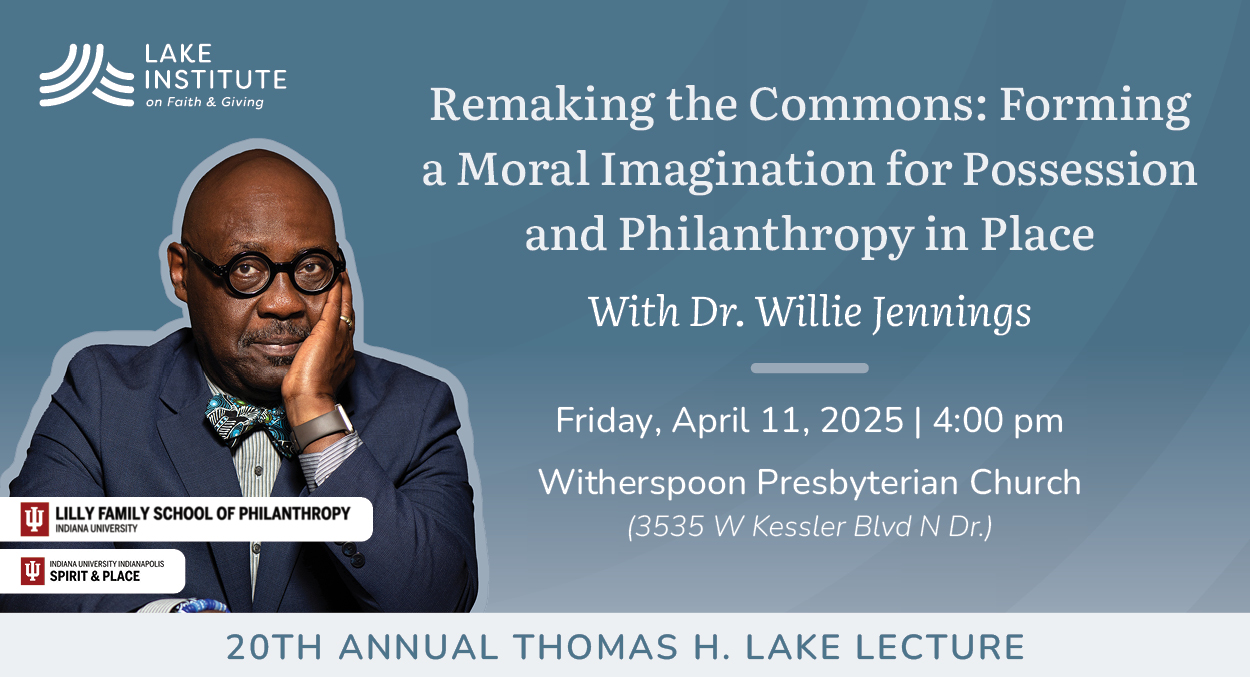Celebrating Two Decades of the Thomas H. Lake Lecture
Celebrating Two Decades of the Thomas H. Lake Lecture
By David P. King, Ph.D., Karen Lake Buttrey Director and Associate Professor, Philanthropic Studies

On April 11, Lake Institute on Faith & Giving will host the 20th Annual Thomas H. Lake Lecture, featuring Yale theologian Dr. Willie Jennings. We invite you to attend the 4 p.m. ET lecture at Witherspoon Presbyterian Church in person or join us via livestream. For this year’s lecture, we are proud to partner with Spirit & Place as part of their Big Tent series.
The Thomas H. Lake Lecture has served as Lake Institute’s signature event since our founding more than two decades ago, allowing us to bring a steady stream of remarkable scholars and thought leaders to Indianapolis to explore the dynamic relationship between faith and giving. You can read or view past lectures here, starting with Robert Wuthnow in 2003. What you will quickly see is that, by exploring faith and giving, Lake Lecturers open up deep questions about the nature of generosity, the making of community, and the many ways that faith shapes our life together.
Our Thomas H. Lake Lecturers approach these broad topics from multiple disciplines, religious traditions, and perspectives. We have hosted theologians and ethicists, sociologists and scholars of religious studies, as well as major fundraisers and political columnists. We have learned from some of the brightest minds in the Muslim, Christian, and Jewish traditions. (One of our earliest Lake Lecturers, the esteemed American religious historian Martin Marty, passed recently. We mourn his loss and give thanks for his profound contribution to our understanding of “The Market and the Donor.”) As the world re-emerged from the COVID-19 pandemic, public voices David Brooks and Anne Snyder reflected together on the ways that faith and giving have played a prominent role in the reweaving of local communities. Most recently, in 2024, noted Jewish studies scholar and interfaith engagement advocate Dr. Susannah Heschel explored the depths of generosity in the Jewish tradition.
Beyond an exploration of multiple facets of faith and giving, the Thomas H. Lake Lecture is designed to connect people across our city, our many silos, and our different sectors. We have steadily maintained a commitment to an in-person lecture, open to the public. While the lectures may tackle big topics, they are shaped and delivered with practitioners and the broader community in view. Our audience is a mix of clergy and laity, nonprofit and philanthropic leaders, as well as university students and interested community members. A hallmark of each event is our reception, designed to allow opportunities for attendees to connect not only with the speaker but with one another. This is why we host lectures across Indianapolis, in public spaces such as congregations, libraries, and museums. The in-person dynamic is vital for allowing local leaders to build relationships and deepen mutual understanding. Yet we also know that not everyone is able to attend in person, and Lake Institute’s own constituency extends far beyond Central Indiana. We are grateful for the ability to provide opportunities to stream the lecture wherever you may be, and we hope that we can continue to find ways to connect with you as well.
Finally, as we explore the dynamic topics of faith and giving and connect with one another, Lake Institute continues to challenge our constituencies to look toward innovation. If one eye is focused on the traditions that ground faith and generosity, the other eye can look toward what we are called to do to meet current and future challenges. This dual focus is just what Dr. Willie Jennings is expected to invite us to employ, through his Lake Lecture on April 11 entitled, “Remaking the Commons: Forming a Moral Imagination for Possession and Philanthropy in Place.”
As one of the world’s pre-eminent theologians, Dr. Jennings has helped us to see how core theological frameworks such as the doctrine of creation can reframe our understanding of our built environment. Too often in these discussions, faith is taken for granted or inserted as a minor modifier for a subset of nonprofit entities (e.g. “faith-based organizations”). But Jennings challenges us to take seriously the ways in which religion – and the Christian imagination – has shaped how we live and think and specifically how we engage with the world around us. An expanded theological lens of belonging and community can help us think differently about concepts like possession, ownership, and property, and approach giving and sharing differently as well. These theological reflections can also provoke us to reexamine presence: how we show up and engage with one another in daily life. The Thomas H Lake Lecture does not shy away from big topics but seeks to connect these topics to the work that donors, nonprofits, congregations, and local communities are doing to encourage lives of mutual care and lives of deep meaning. We invite you to join us in this crucial work, and a first step might be attending this year’s Lake Lecture on April 11.
Remaking the Commons: A Few Big Questions with Dr. Willie Jennings
In preparing for the 20th Annual Thomas H. Lake Lecture, we asked this year’s lecturer Dr. Willie Jennings ‘a few big questions’ about philanthropy, religious giving, and private property. Read on for his thoughtful responses and a glimpse into his vision for the future.
 You have talked about a moral compass for capitalism, particularly around private property. What might be a moral compass for philanthropy, and for religious giving in particular?
You have talked about a moral compass for capitalism, particularly around private property. What might be a moral compass for philanthropy, and for religious giving in particular?
To take hold of a moral compass in this moment is an act of great courage. The kind of moral compass that is urgently needed now is one that orients us toward an expansive vision of the common good, one that breaks down division. This is the fundamental difference between giving rooted in religious practice and giving that begins with ideas of investment, leverage, or self-interest. Giving rooted in a moral compass bound up with religious practice is giving that is a response to the gift of life and therefore starts at the end in the desire to see people and places flourish. It is giving that is shaped in grace. This does not mean that strategic thinking is absent. It means that our strategies are bound up in a sense of reciprocity—I give because I live and that is grace.
At the Lilly Family School of Philanthropy, we sometimes define philanthropy as “private action for the public good.” Does that definition resonate with you at all, in light of your reflections on private property?
The definition of philanthropy as private action for the public good certainly resonates with me, especially if we understand the private as a reality always aimed toward the public. As Martin Luther King Jr. said so eloquently, we are tied together in a web of destiny. But these days, we are acutely aware that we are bound together in a web of life that begins with the land and encompasses the built environment. This means that every private action implicates the public good. From how we treat water to our individual generation of trash, to how we imagine our living in terms of housing, neighborhoods, and transportation. We are always “giving” something. The question is: are we giving that which creates and enhances life or that which lessens and even destroys life?
How do we navigate the tension between ‘being ourselves’ and being able to enter into the lives of others? Can we give humbly? Or is giving by its very nature self-interested?
One of the most difficult concepts to get people to rethink is the idea of “the self.” One of our deepest points of deception is to believe that a self is an entity that exists in isolation and enclosed when in point of fact what we are is a weaving of so many things and people. The term often used today is enmeshment. And here, enmeshment is not a bad thing, as in the ways psychologists talk about. Enmeshment means that I am always receiving life and being drawn into giving life. The real tension here is moving from ways of living and thinking that resist and deny the pull, the call if you will, toward giving and sharing, by imagining that caring for my life is separable from caring for others beyond my immediate circle of family and friends. When people imagine and enact life in that way, they become exploitive, competitive to the point of being xenophobic, and captured in a vision of life constituted in scarcity rather than abundance. So, giving is in fact the way to being ourselves.
What are you most curious about when you think about the concept of generosity in American life?
Today, I am most curious about whether people in this country can start to see and live into our connectivity. American life on the ground in the ways our cities and communities are built perpetuates the lie that we are independent of each other, in our homes, in our neighborhoods, in our towns and cities. We tend to imagine everything from water to air to electricity to our food individually through the logics of consumption and production. We have reached a tipping point where that kind of thinking is killing us. My curiosity is if we are ready to see this problem and claim our connectivity.
What is something that you have watched, heard, or read that has inspired you in the last few months?
I recently heard the great Native poet Joy Harjo in person, reading from her collection, Catching the Light. Included with the event of her reading was a card with her poem “Perhaps the World Ends Here.” The first line of the poem is as follows:
“The world begins at a kitchen table. No matter what, we must eat to live.”
Podcast featuring Dr. Willie Jennings
 If you’d like to hear more from Dr. Willie Jennings before the Lake Lecture on April 11, we invite you to listen to this insightful conversation he had with our partners at RootedGood.
If you’d like to hear more from Dr. Willie Jennings before the Lake Lecture on April 11, we invite you to listen to this insightful conversation he had with our partners at RootedGood.
Igniting Imagination Podcast
Season 13: Church Property: Imagining Good Futures | Episode 3
How does theology shape church property decisions?
Explore Past Thomas H. Lake Lectures
 Looking ahead to this year’s Thomas H. Lake Lecture, we encourage you to read and watch past lectures that have shaped conversations on faith and giving over the past 22 years. From Robert Wuthnow’s 2003 lecture on Christian charity and spiritual practice to last year’s discussion with Dr. Susannah Heschel on generosity in the Jewish tradition, these talks have featured insightful scholars and thought leaders from multiple disciplines, religious traditions, and perspectives.
Looking ahead to this year’s Thomas H. Lake Lecture, we encourage you to read and watch past lectures that have shaped conversations on faith and giving over the past 22 years. From Robert Wuthnow’s 2003 lecture on Christian charity and spiritual practice to last year’s discussion with Dr. Susannah Heschel on generosity in the Jewish tradition, these talks have featured insightful scholars and thought leaders from multiple disciplines, religious traditions, and perspectives.
Subscribe
Insights is a bi-weekly e-newsletter for the religious community and fundraisers of faith-based organizations that provides:
- Reflections on important developments in the field of faith and giving
- Recommended books, studies and articles
- Upcoming Lake Institute events

